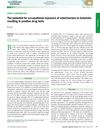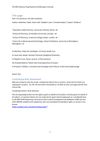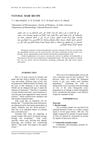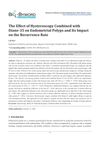 3 citations,
April 2018 in “Holzforschung”
3 citations,
April 2018 in “Holzforschung” Scientists found a new natural compound and other known compounds in Cercidiphyllum japonicum twigs, which might be useful for medicine.
 3 citations,
July 2013 in “Bioscience, Biotechnology, and Biochemistry”
3 citations,
July 2013 in “Bioscience, Biotechnology, and Biochemistry” Chinese black tea extract helped mice grow hair, especially when combined with capsaicin.
 3 citations,
February 2018 in “Australian Veterinary Journal”
3 citations,
February 2018 in “Australian Veterinary Journal” Veterinarians could test positive for ketamine from work exposure, not just substance abuse.
 3 citations,
January 2018 in “Open Access Macedonian Journal of Medical Sciences”
3 citations,
January 2018 in “Open Access Macedonian Journal of Medical Sciences” Implant safely and effectively treats hair loss.
 2 citations,
March 2021 in “Journal of Cosmetic Dermatology”
2 citations,
March 2021 in “Journal of Cosmetic Dermatology” Umbilical cord-derived media is safe and effective for hair growth.
 2 citations,
January 2011 in “Andrologia”
2 citations,
January 2011 in “Andrologia” Flutamide and a new synthetic steroid affected brain and prostate chemicals and showed potential for treating androgen-related conditions and epilepsy.
 2 citations,
February 2022 in “BMJ”
2 citations,
February 2022 in “BMJ” Emollients can make fabrics more flammable, so take safety precautions.
 1 citations,
May 2021 in “Journal of Cosmetic Dermatology”
1 citations,
May 2021 in “Journal of Cosmetic Dermatology” Cosmetic foam product reduces hair loss and increases hair density in men.

Understanding hair surface properties is key for effective hair care products.
 1 citations,
June 2018 in “Advances in Cosmetic Surgery”
1 citations,
June 2018 in “Advances in Cosmetic Surgery” PRP might help with hair growth and skin rejuvenation, but more research is needed to prove its effectiveness.
 1 citations,
January 2018
1 citations,
January 2018 Tattooing guidelines focus on safety, hygiene, and following rules.
 1 citations,
February 2023 in “International journal of research - granthaalayah”
1 citations,
February 2023 in “International journal of research - granthaalayah” Electromagnetic energy from wound dressing paste can disrupt skin lipid droplets, possibly affecting cancer development.
 1 citations,
December 2021 in “International journal of research in dermatology”
1 citations,
December 2021 in “International journal of research in dermatology” Dermatologists should learn more about shampoos to better treat hair and scalp issues.
 1 citations,
May 2014 in “Lipid Technology”
1 citations,
May 2014 in “Lipid Technology” New cleaning surfactants, biofuel production plans, dairy expansions, improved lipid testing methods, and various product launches and developments were reported in lipid technology.
 December 2024 in “Turkish Society of Clinical Biochemistry”
December 2024 in “Turkish Society of Clinical Biochemistry” Higher BPA levels may be linked to idiopathic hyperandrogenemia in women.
 April 2024 in “Research Square (Research Square)”
April 2024 in “Research Square (Research Square)” MSC-protein helps regenerate gum tissue and bone.
 January 2024 in “Journal of Natural Remedies”
January 2024 in “Journal of Natural Remedies” Solanum nigrum extract may help regrow hair.
 September 2023 in “bioRxiv (Cold Spring Harbor Laboratory)”
September 2023 in “bioRxiv (Cold Spring Harbor Laboratory)” Freezing gamma-irradiated amniotic fluid may help hair growth and speed up the growth phase.
 June 2023 in “Animal Bioscience”
June 2023 in “Animal Bioscience” Vimentin and transthyretin proteins are linked to black coat color in sheep.
 March 2023 in “Journal of pharmacognosy and phytochemistry”
March 2023 in “Journal of pharmacognosy and phytochemistry” Unripe fruits of three banana species have many health-boosting compounds useful for medicine.
 February 2023 in “Asian journal of pharmaceutical research and development”
February 2023 in “Asian journal of pharmaceutical research and development” Flavonoids in Iraqi marshland plants have potential health benefits like antioxidant and anti-inflammatory effects.
 July 2022 in “Research Square (Research Square)”
July 2022 in “Research Square (Research Square)” Hair analysis can somewhat track past testosterone levels but is influenced by factors like hair washing, growth rate, sex, and hair color.
 March 2021 in “Egyptian Journal of Chemistry”
March 2021 in “Egyptian Journal of Chemistry” The herbal shampoo with Momordica charantia and Hibiscus Rosa-Sinensis is safe and promotes hair growth and scalp health.
 January 2019 in “ARC journal of pharmaceutical sciences”
January 2019 in “ARC journal of pharmaceutical sciences” Acne can be managed with various treatments and requires psychological support due to its emotional impact.
 January 2019 in “Springer eBooks”
January 2019 in “Springer eBooks” Transplanting skin cells is a safe, effective, and affordable treatment for vitiligo.
 September 2009 in “Pediatric Dermatology”
September 2009 in “Pediatric Dermatology” UVB is good for a skin condition in Asian kids, a lotion works for head lice, a drug helps with a skin blistering disorder, a foam reduces itchiness in skin inflammation, birthmarks can be more widespread, and criteria for a neurocutaneous disorder were agreed upon.
 June 2004 in “Bulletin of Pharmaceutical Sciences. Assiut University”
June 2004 in “Bulletin of Pharmaceutical Sciences. Assiut University” The natural hair treatment with Cantharidin works best for hair loss.
 January 1998 in “Lasers in Surgery and Medicine”
January 1998 in “Lasers in Surgery and Medicine” Lasers are effective and safe for various medical treatments, including cancer, wound healing, and skin conditions.
 March 2024 in “Advances in obstetrics and gynecology research”
March 2024 in “Advances in obstetrics and gynecology research” Combining hysteroscopy with Diane-35 improves outcomes and reduces recurrence of endometrial polyps.
 December 2023 in “International journal of multidisciplinary research and analysis”
December 2023 in “International journal of multidisciplinary research and analysis” SH-MSCs gel reduced IL-6 and increased TGF-β, suggesting it could treat alopecia.





























